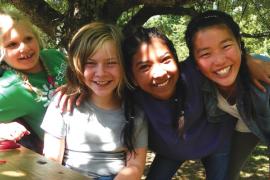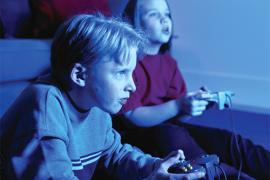Hypothesis: "The fight against child molesters begins by parents teaching their children."
The Problem
Sexual abuse of children and youth remains an insidious concern in American society. Almost every variety of congregate care programs, without exception, has experienced emotional devastation when a parent or caregiver reveals that their child has alleged some form of inappropriate intimate behavior carried out by an older child or adult. Residential and day camps are not exempt. Years ago, when such an allegation was brought to the attention of camp directors, the immediate reaction might have been, "Not possible. Not him; he is one of our most admired employees and has been with us for years."
Ninety-five percent of the sexual abuse of youngsters is done by family members, those who work with children, or those who know them. Current information indicates that strangers essentially make up about fi ve percent of the reported documented cases. Eighty-four percent of sexual abuse of children is unreported. Many parents do not want their child labeled as a survivor of sexual abuse and make the decision to deal with it privately rather than involve law enforcement. When that decision is made, most often the abuser is free to repeat the behavior while he or she unfortunately remains anonymous.
A Camp Nightmare
Many years ago at a residential boys' camp, twelve boys between the ages of seven and nine were sexually molested by a pedophile (pedophilia, as documented in the American Psychiatric Association's Diagnostic and Statistical Manual of Mental Disorders, is a psychiatric diagnosed illness) who had a three-year history at camp and was the favorite of most campers as well as staff (2000). Not one of the twelve revealed the abuse while it was happening. The abuse was learned by the camp director when one of the seven-year-old boys, "Josh," returned home and exclaimed to his parents, "This was the best summer of my life." Delighted with his comment, his mom and dad were pleased with their decision to send him to camp.
When the parents asked what made it the best summer, the child gave credit to a favorite counselor. He talked about "Bobby's funny stories," his "good night kisses," and his "special rub-adubs." The parents asked their son to demonstrate, and to their horror, they knew that their son had been sexually molested. Josh's parents called the camp director. He called me.
As a trained responder after allegations of inappropriate intimate behaviors are made, I was invited to this camp. I interviewed each of the twelve campers with the camp director and/or parent(s) present.
The responses of the campers fell into fi ve signifi cant categories:
- Seven campers permitted the kissing and "rub-a-dubs" because they had no idea it was wrong.
- Two campers who thought it might be wrong allowed it because the counselor was their favorite person at camp.
- One camper said he was confused; the "Good Touch / Bad Touch" he had learned from his mother made no sense because what the counselor was doing felt good, so he thought it couldn't be a bad touch. He demonstrated how his inner thigh was being rubbed by Bobby as a story was being told to him and other campers.
- One camper said he liked it and had no reason to believe it was wrong.
- One camper said the counselor told him not to tell anyone.
In retrospect, it is important to note that the responses of these youngsters many years ago were what one would expect given the fact that identifi cation and prevention of child sexual abuse was not something that the vast majority of parents, caregivers, schools, camps, and other congregate care programs or providers recognized as a priority issue.
In fact, incidents were often kept quiet. Some, but not many, professionals were trained to deal with this problem. As a residential treatment center practitioner and administrator for thirty-six years, I had firsthand knowledge of the effects of sexual molestation on youth and adolescents. As psychiatrists, psychologists, and social workers became much more knowledgeable and better able to understand dysfunctional family dynamics and the difference between pedophiles and child molesters, victims of molestation began to get the treatment they so desperately needed to put their lives back together again. What became clear was that the trauma of sexual molestation was overwhelming — regardless of whom the perpetrator was — and without appropriate treatment, a survivor's life could very well be compromised.
Journey to the Solution
In this, the twenty-first century, the recognition of child sexual molestation has certainly evolved to a more acceptable level of acknowledgment among professional caregivers of children who are enjoying a much more substantial level of safety while away from their homes. For many years, the American Camp Association (ACA) has addressed this issue and clearly mandates in its accreditation requirements that all camps provide specific training on this topic. And many camps recognize this issue as a number one priority in caring for other people's children.
However, in 1994, after responding to two programs where sexual abuse had taken place, I realized that the role of sexual abuse prevention had to be totally reconsidered. It became clear to me that parents had to learn to teach their youngsters how to protect themselves from those who would harm them. They could no longer expect that any other person or program could be counted on to deliver this essential information.
After researching the countless number of existing programs designed to offer suggestions to parents and teachers, while all certainly acceptable, I found a common problematic thread within all of them. In each system, the child had to make a value judgment as to whether or not the person or the touch was acceptable. Age, level of maturation, developmental issues, and other important factors all become impediments to the process of self-protection.
Partnering With Parents
The No Touch Zone
Partnering is defined as collaboration, and I believe the camp community can and should help parents and guardians understand their responsibility to teach their children how to protect themselves from predators before they leave home to attend school or camp. Parents need to recognize that the responsibility to impart this critical information belongs only to them and no one else. Other appropriate adults can reinforce, remind, and be supportive of the parental process, but the responsibility rests with the parents.
We as camp professionals can provide parents and caregivers with the tools needed to help them — in an easy-to-communicate, non-anxiety provoking, and non-threatening program.
- Teaching the No Touch Zone includes the following:
- Teach children the names of their body parts beginning at eighteen months through age five.
- At age fi ve, teach children that private parts are now called the No Touch Zone.
- The No Touch Zone is from the waist to the knees, all the way around, and includes the chest area for a girl. (It is no longer the parts covered by a bathing suit or underwear.)
- Parent(s) should create a permission list which includes the child, parent(s), and some selective others who may touch the No Touch Zone, but no one else has permission unless or until a person is added to the list and personally introduced to the child by the parent, face-to-face, or by telephone contact in an emergency.
- Anyone not on the list who attempts to touch the No Touch Zone is told by the child: "You are not allowed to touch me there," or "I am not allowed to touch you there."
The concept of this system is that only those people on the permission list may touch the child's No Touch Zone. All others are strangers forbidden to touch this identified area. The child is instructed to tell his/her parent(s) immediately who attempted to touch the forbidden area. Child molesters and pedophiles do not wish to get caught. Children who are "savvy" will make them think twice.
Savvy Children
We want savvy children. When parents realize their responsibility in protecting their children and implement a program like the No Touch Zone, we can reduce the number of seriously affected children in a very short time period. Over the years, I have received dozens of communications from parents that begin with, "Thank you. You saved my child from sexual molestation." While I must admit that I love to hear that comment, I immediately remind parents that they, not I, taught their children how to protect themselves from a predator.
An anxious parent shared with me that she didn't know how to explain anything about self-protection. She never learned it as a child and feared the process. However, using this method, she said she felt comfortable because it was not about sex or violence. When she explained to her son that the only people in the whole world who could touch that area had to have her permission, her son said, "Why can't anyone else touch me there?" She responded that it's against the law. "You mean the person could go to jail?" queried her son. "You said it," said mom confi dently. It was a perfect response to a five-year-old.
A school nurse expressed some concern about the No Touch Zone permission list by suggesting a problematic scenario. A child is injured on the playground and brought to her offi ce. He or she identifi es the groin as the area in pain. If the nurse asks the child to permit her to examine the area identifi ed and the child responds, "No, you are not on the permission list," what should she do? The nurse can begin by congratulating the child for remembering his mom or dad's instructions. Then tell the child she will call his parents to get permission to be on the list.
Children enter this world without a "manual of instructions" and parents are "parents in training," as was once noted by the famous psychologist and baseball expert Dr. Joyce Brothers on her syndicated radio show (1960). Camp directors, as partners in the process of raising other people's children, have earned a very special role. As educators, caregivers, and protectors in loco parentis, you are perfectly poised to offer critical advice that addresses a serious societal problem. I urge you to identify the issue, and offer your suggestions as to how together, parents and camps can protect children from molestation, whether at home, school, sleepovers, camp, or anywhere else. Parents, as always, will be grateful for your advice and your continued interest in their children, especially in the off-season. Camp directors care for more than 10 million children every year. Add into the numbers the thousands of staff and counselors in nationwide programs, many of whom are parents themselves. The problem addressed by you, explained to parents, and taught as described on page 48 in the sidebar "Mailing to Parents on Your Camp Stationary" can bring about incredible safety for children.
References
American Psychiatric Association. (2000). Diagnostic and statistical manual of mental disorders (Revised 4th ed.). Washington, DC. (Specifi cally, Code 302.2)
Brothers, Dr. J. (1960). New York: Radio Station WNEW.
During the last eleven years, Norman E. Friedman, M.Ed., has visited more than 350 camps as a result of his professional relationship with the AMSkier Insurance Agency, and presented a workshop titled, "The Care and Safety of Other People's Children." Norm is the dean of Gene Ezersky Camp Safety College and the advisory board chair for the MS Camp Administration and Leadership program at Touro University Nevada. For additional information visit: www.stopitnow.org or contact Norm at [email protected].
Originally published in the November/December 2010 Camping Magazine.


